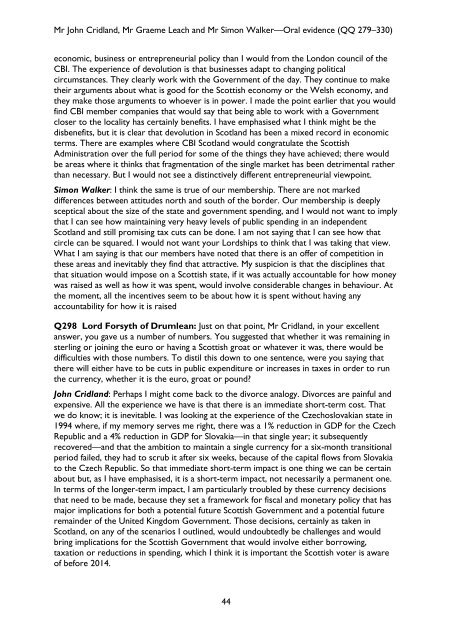SELECT COMMITTEE ON ECONOMIC AFFAIRS - Parliament
SELECT COMMITTEE ON ECONOMIC AFFAIRS - Parliament
SELECT COMMITTEE ON ECONOMIC AFFAIRS - Parliament
You also want an ePaper? Increase the reach of your titles
YUMPU automatically turns print PDFs into web optimized ePapers that Google loves.
Mr John Cridland, Mr Graeme Leach and Mr Simon Walker—Oral evidence (QQ 279–330)<br />
economic, business or entrepreneurial policy than I would from the London council of the<br />
CBI. The experience of devolution is that businesses adapt to changing political<br />
circumstances. They clearly work with the Government of the day. They continue to make<br />
their arguments about what is good for the Scottish economy or the Welsh economy, and<br />
they make those arguments to whoever is in power. I made the point earlier that you would<br />
find CBI member companies that would say that being able to work with a Government<br />
closer to the locality has certainly benefits. I have emphasised what I think might be the<br />
disbenefits, but it is clear that devolution in Scotland has been a mixed record in economic<br />
terms. There are examples where CBI Scotland would congratulate the Scottish<br />
Administration over the full period for some of the things they have achieved; there would<br />
be areas where it thinks that fragmentation of the single market has been detrimental rather<br />
than necessary. But I would not see a distinctively different entrepreneurial viewpoint.<br />
Simon Walker: I think the same is true of our membership. There are not marked<br />
differences between attitudes north and south of the border. Our membership is deeply<br />
sceptical about the size of the state and government spending, and I would not want to imply<br />
that I can see how maintaining very heavy levels of public spending in an independent<br />
Scotland and still promising tax cuts can be done. I am not saying that I can see how that<br />
circle can be squared. I would not want your Lordships to think that I was taking that view.<br />
What I am saying is that our members have noted that there is an offer of competition in<br />
these areas and inevitably they find that attractive. My suspicion is that the disciplines that<br />
that situation would impose on a Scottish state, if it was actually accountable for how money<br />
was raised as well as how it was spent, would involve considerable changes in behaviour. At<br />
the moment, all the incentives seem to be about how it is spent without having any<br />
accountability for how it is raised<br />
Q298 Lord Forsyth of Drumlean: Just on that point, Mr Cridland, in your excellent<br />
answer, you gave us a number of numbers. You suggested that whether it was remaining in<br />
sterling or joining the euro or having a Scottish groat or whatever it was, there would be<br />
difficulties with those numbers. To distil this down to one sentence, were you saying that<br />
there will either have to be cuts in public expenditure or increases in taxes in order to run<br />
the currency, whether it is the euro, groat or pound?<br />
John Cridland: Perhaps I might come back to the divorce analogy. Divorces are painful and<br />
expensive. All the experience we have is that there is an immediate short-term cost. That<br />
we do know; it is inevitable. I was looking at the experience of the Czechoslovakian state in<br />
1994 where, if my memory serves me right, there was a 1% reduction in GDP for the Czech<br />
Republic and a 4% reduction in GDP for Slovakia—in that single year; it subsequently<br />
recovered—and that the ambition to maintain a single currency for a six-month transitional<br />
period failed, they had to scrub it after six weeks, because of the capital flows from Slovakia<br />
to the Czech Republic. So that immediate short-term impact is one thing we can be certain<br />
about but, as I have emphasised, it is a short-term impact, not necessarily a permanent one.<br />
In terms of the longer-term impact, I am particularly troubled by these currency decisions<br />
that need to be made, because they set a framework for fiscal and monetary policy that has<br />
major implications for both a potential future Scottish Government and a potential future<br />
remainder of the United Kingdom Government. Those decisions, certainly as taken in<br />
Scotland, on any of the scenarios I outlined, would undoubtedly be challenges and would<br />
bring implications for the Scottish Government that would involve either borrowing,<br />
taxation or reductions in spending, which I think it is important the Scottish voter is aware<br />
of before 2014.<br />
44

















